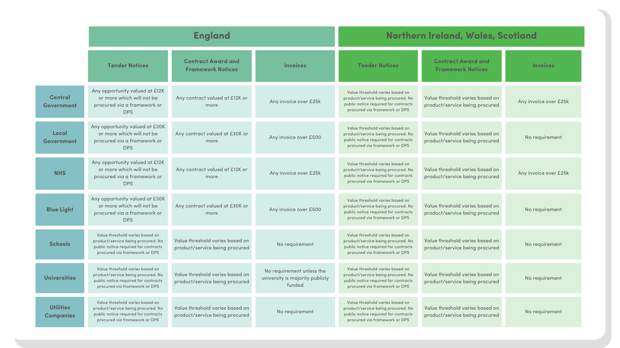Tussell's market intelligence platform shows that the UK public sector released over 38,000 tenders & Pre-Information Notices in 2023, and awarded a staggering 70,000 contracts to suppliers.
In the UK, the public procurement process begins when a contracting authority issues a tender notice, inviting organisations to bid on supplying specified goods or services. Suppliers then submit their bids, a winner is chosen, and a contract award is published.
Some tenders are open to all, whereas others are open to just those on specific framework agreements (preferred supplier agreements).
.png?width=584&height=329&name=Direct%20NHS%20spending%20with%20IT%20companies%20has%20increased%20by%20216%25%20since%20FY%202016-17%20(12).png)
If you want to start working with the UK public sector, you'll need to know how to monitor new tender opportunities, and see what work has already been awarded in the past to inform your business strategy.
This article discusses government tenders and contracts, where you can find them, and how to leverage these sources to uncover upcoming opportunities to sell more to the public sector.
Skip ahead to read about:
- What types of government tenders and contract notices are there?
- What are government bodies required to publish?
- Where to find tender and contract notices
- Changes to notice publishing in the upcoming Procurement Act 2023
-
How to utilise pre-procurement, contract award, and invoice notices to sell more to government
- Conclusion
📝 What types of government tenders and contracts are there?
Broadly, public sector bodies publish notices relating to the three phases of the procurement cycle: the pre-tender stage via pre-procurement notices; the tendering stage via tender notices; and the award stage via contract award notices.
Invoices relating to procured products and services are also published separately and can be used to uncover market trends and anticipate upcoming sales opportunities.
📣 Pre-procurement notices
Pre-procurement notices may be published prior to a tender notice.
Two types of pre-procurement notice types were introduced under the 2023 Procurement Act:
-
'Preliminary Market Engagement Notices' - published when a contracting authority wants to conduct pre-tender market engagement.
-
'Planned Procurement Notices' - between 40 days and 12 months before a planned tender's publication, a contracting authority can publish a planned procurement notice to inform suppliers of its upcoming arrival.
Public bodies are not required to publish these pre-procurement notices, but they may choose to do so. This can be helpful when procuring complex or important services and products, allowing for market consultation or giving suppliers more time to prepare.
Tussell tip: closely monitor pre-procurement notices published in your niche. They serve as an early signal of a tender's arrival. Better still, pre-tender market engagement gives you the opportunity to influence the tender's creation. Don't waste this opportunity to meet and engage with the buyer in these early stages.
Not up-to-speed on the Procurement Act?
Access our free Procurement Act Hub.
📜 Tender notices
Tender notices - also known as contract notices - are issued when a public sector authority is looking to procure a product or service, or when a new preferred supplier agreement (framework) is being built.
Tender notices are intended to alert potential suppliers of an opportunity to sell to government, and are usually open for a period of between 30-35 days (although this can vary).
Qualifying tenders must first be published on the Government's Find a Tender service, although other tenders may be published in one of 80+ publicly available government portals across the internet depending on the nature of the work and the type of buyer.
Public sector market intelligence platforms like Tussell compile pre-procurement notices and tenders from all major public sector portals to give users access to the broadest range of opportunities from across the public sector market.
.png?width=620&height=349&name=Direct%20NHS%20spending%20with%20IT%20companies%20has%20increased%20by%20216%25%20since%20FY%202016-17%20(10).png)
Whilst pre-procurement and tender notices can be found publicly online, an increasing number of contracts are awarded via closed framework agreements and Dynamic Purchasing Systems (DPSs, now 'Dynamic Markets' under the 2023 Procurement Act)
Frameworks, DPSs and Dynamic Markets are essentially 'pre-approved supplier lists', used by contracting authorities to expedite the procurement process by only offering tender opportunities to a select group of known suppliers.
Contracting authorities are under no obligation to publicly notify the market about tenders going via most frameworks and DPSs/Dynamic Markets. As such, knowing which frameworks your business should be on is vital when looking to sell to the public sector.
Find out which frameworks are being used most in your market.
🏆 Award notices
Contracting authorities who fall under the scope of the 2023 Procurement Act must publish awarded contracts onto Find a Tender.
If a contract was awarded under the old procurement regime (or is a call-off contract awarded via an old regime framework agreement), it is instead published on Contracts Finder.
Award notices generally fit into one of two categories:
Contract awards
A contract award notice is published to mark the procurement of a product or service by a public sector buyer. These notices contain the contract value and details pertaining to the chosen supplier (such as the supplier name and whether the supplier is an SME and/or VCSE).
Frameworks & DPSs
A Framework or DPS/Dynamic Market award notice marks the formation of a preferred supplier list. The estimated lifetime value of the framework agreement or DPS and a list of all the chosen suppliers are included in the notice.
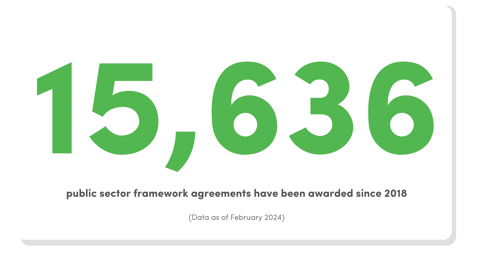
The suppliers listed on a framework notice will then have exclusive visibility of all tender opportunities on the framework. However, a retrospective contract award notice will still have to be published for any contract awarded via the framework.
Most public sector authorities (with a few notable exceptions - see below) are required to publish procurement invoices on a quarterly basis.
Many of these invoices will be payments to suppliers to fulfil previously awarded contracts.
As such, details of most public sector spending are in the public record.
However, unlike tender and contract notices, invoices are often published as long sheets of data on a government authority's own website. They also often lack detail as to what each payment specifically relates to.
For this reason, conducting broader analysis on public sector spending within your sector is almost impossible without the use of a market intelligence platform like Tussell.
✉️ Which tenders, contracts and invoices are government bodies required to publish?
Different public sector bodies are subject to different procurement publishing regulations.
The matrix below provides a guide to what information various public sector bodies are required to publish.*
* This is a simplified matrix and should not be taken as legal advice for government authorities on publishing requirements.
Rules, value thresholds and exemptions vary by region, contract type and public sector body. Other exemptions may also apply. For example, contract and tender notices relating to classified information and state secrets are often exempt from publishing regulations.
Defence contracts are also subject to higher-value publishing thresholds, and some publishing exemptions are carved out for utilities companies.
Some buyers may voluntarily publish contracts and tender notices in the interest of transparency or increasing competition in the procurement process.
🔎 Where to find tender and contract notices
In addition to Find a Tender, the other official and/or mandatory UK portal(s) for qualifying tender notices in each region are listed below:
.png?width=475&height=267&name=Direct%20NHS%20spending%20with%20IT%20companies%20has%20increased%20by%20216%25%20since%20FY%202016-17%20(9).png)
Other tender and contract notices that do not meet various value thresholds may be published in other local, regional or sector-based portals.
Typically, tender portals enable users to use keywords and select CPV (common procurement vocabulary) codes to search for relevant contracts and/or tenders.
Public sector market analysis platforms can also be used to find tenders and contracts. Tussell scrapes 100s of online portals and government websites to find tender notices, PINs, contract notices, framework notices and invoices.
Tussell then augments the data by adding in additional framework information, contract end dates, and the contact details of key government stakeholders.
This helps users build a market strategy, find expiring contracts and upcoming opportunities and, ultimately, sell more to government.
⏩ Changes to notice publishing in the 2023 Procurement Act
The 2023 Procurement Act is the biggest shake-up to UK procurement law in a generation.
The Act introduces several changes to the pre-tender, tendering and contract publication process.
The key things you need to know are:
-
In-scope contracting authorities must publish new pre-tender notices, tenders and contracts onto the updated Find a Tender service (the 'Central Digital Platform')
-
The Act introduced two types of pre-market engagement notices: Preliminary Market Engagement Notices and Planned Procurement Notices.
-
New 'Assessment Summaries' require contracting authorities to explain to suppliers why they were unsuccessful after losing a competitive bid, while 'Transparency Notices' explain why a contracting authority used a non-competitive process to award a contract.
-
'Contract Performance Notices' are required to be published for certain large contracts, detailing how successfully suppliers are delivering against set KPIs.
-
New 'Open Frameworks' and 'Dynamic Markets' introduce more accessible and flexible ways for suppliers to bid on government contracts.
These changes are intended to make the procurement cycle more transparent and accessible to smaller businesses.
Wrapping your head around these changes, and how to take advantage of these new changes, will put you in a prime position to succeed under the new regime.
Confused? Don't worry! Download Tussell and Mills & Reeves' helpful flowchart outlining the full list of notices set to be brought in, or read our Procurement Act Guidebook for free.
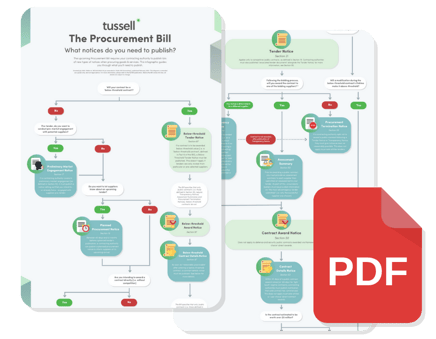
🚀 How to utilise tenders, contracts & invoices to sell more to government
The simplest and most reactive way of using procurement notices to sell to government is by monitoring tender portals for upcoming tender opportunities, and then bidding on the ones that are in your niche and you think you have a chance of winning.
However, this approach is both time-consuming and limited in its efficacy.
A reactive approach puts your team on the backfoot, limiting the amount of time you have to curate your bid to the buyer's needs, and build a relationship with them.
Moreover, as the government moves towards framework agreements, the percentage of public sector work that originates from tender notices decreases.
Many suppliers to government are using tools such as Tussell to anticipate upcoming opportunities months - or even years - before a tender notice comes out.
By utilising pre-information notices and by building a pipeline of upcoming contract expiries, early-worm suppliers to government can begin laying the sales and marketing groundwork before other suppliers are even aware of an opportunity.
.png?width=620&height=349&name=Direct%20NHS%20spending%20with%20IT%20companies%20has%20increased%20by%20216%25%20since%20FY%202016-17%20(13).png)
The era of combing through tender notices has ended; a robust and data-driven approach to selling to government is now required.
Such an approach utilises all forms of procurement notices and published invoices to:
-
find and locate growing markets in your sector
-
uncover the right frameworks to sell to your target customers
-
anticipate upcoming contract expiries and market engagement days ahead of tender
-
find the right tenders for your business to bid on
🌅 Conclusion
The UK public sector is issuing more and more tenders and contracts each year. As the public sector market continues to expand, the opportunity for suppliers has never been greater.
Tender, pre-information, contract and framework notices provide suppliers with the information they need to anticipate upcoming opportunities and employ a data-driven approach to public sector sales.
There is no singular public source of all government procurement notices. And, whilst the Procurement Act 2023 promises to usher in some positive changes to public sector procurement publishing, strong data and a holistic and proactive approach will remain vital for suppliers selling to government.
Tussell compiles, augments and cleans procurement notices from all over the web to provide a singular source of opportunities and market intelligence for suppliers to government.
Book a demo with the Tussell team to find out how you can benefit from Tussell's insights.




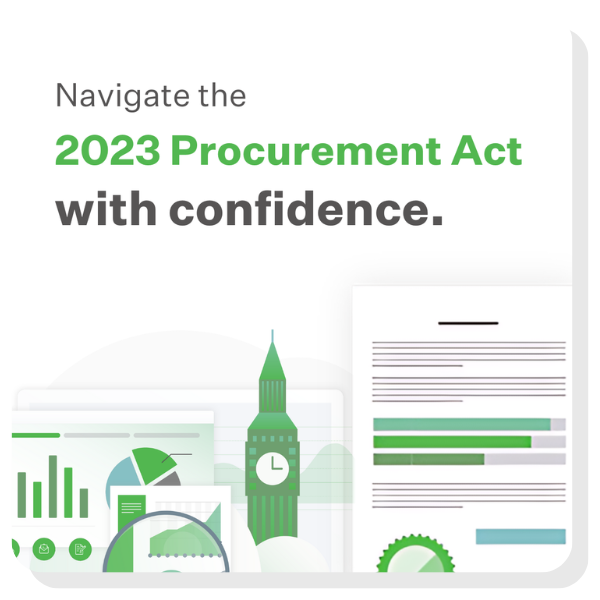





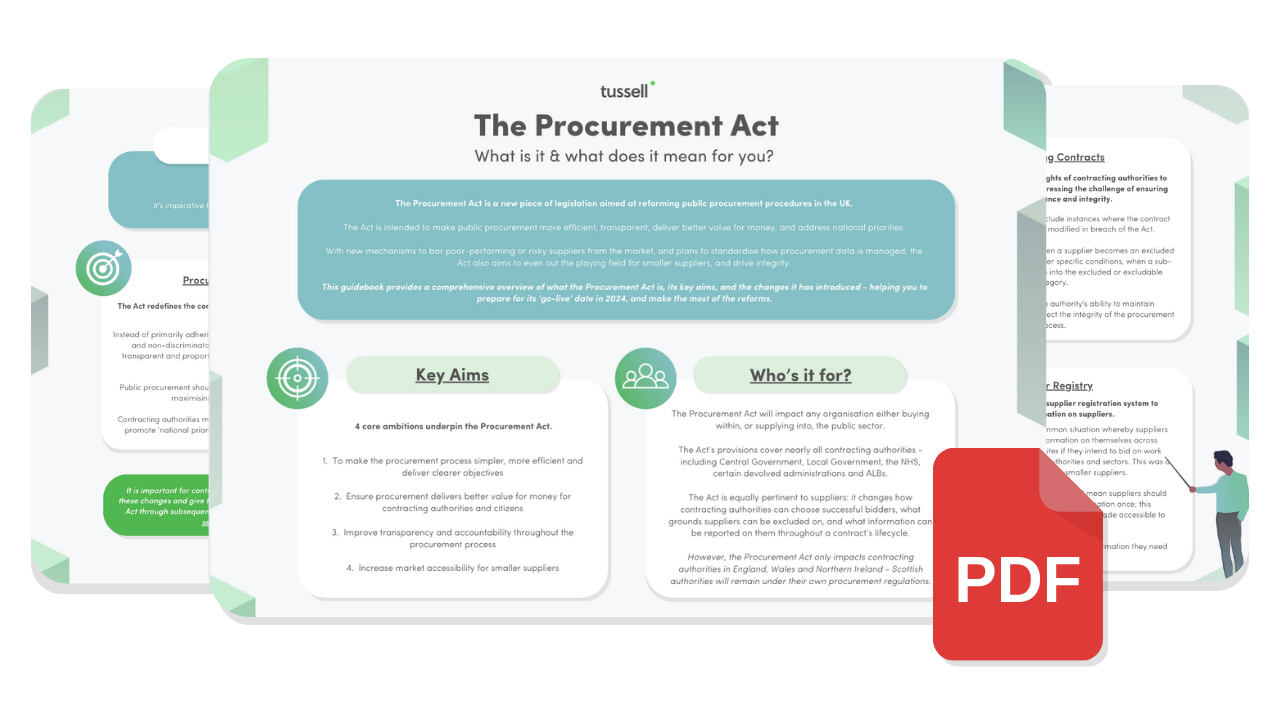

-1.png?width=450&height=330&name=Procurement%20Act%20Hub%20Graphics%20(1)-1.png)
.png?width=400&height=283&name=Public%20Sector%20Framework%20Report%202025%20(3).png)

